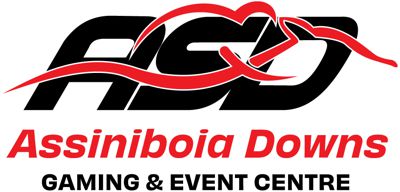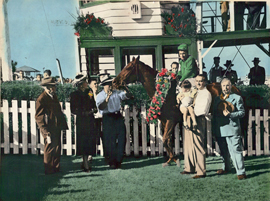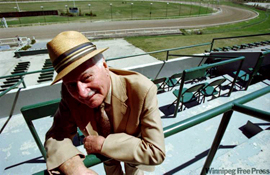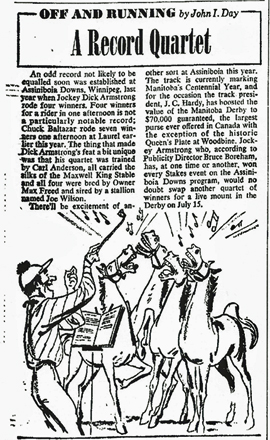by Bob
Before telling you about this Manitoba racing icon’s deal with TV game show host Monty Hall, let me give you some background on one of the greatest and well-known local horseman, Max Freed.
Max was born to David and Tilley Freed on February 22, 1912 in Brooklyn, New York, but moved to Winnipeg before he was a year old. He was a natural “mover and shaker” and grew to be an astute entrepreneur whose business interests were many and varied. Over time, through his company Hercules Manufacturing, Max became known as the “King of Shirt-Making in North America.” But horse racing was his passion!
In the spring of 1942 Freed and Hall’s paths crossed in a chance encounter, and the meeting led to Freed providing financial assistance to the 20-year-old future host of popular TV game show Let’s Make a Deal. The money however, came on the condition that it be repaid; that Hall maintain top grades; that he promise to help someone else in his lifetime; and lastly, he was never to tell anyone where the money came from. Hall kept his end of the bargain with one exception.
He maintained his silence for almost 30 years, but eventually shared the story of his anonymous benefactor. Hall felt Freed deserved the recognition and he hoped that it would inspire others to also pay it forward.
Freed loved horse racing. He owned and bred thoroughbreds in a career that spanned seven decades. In the 1940s he got his start in K & K Stables with Frank Kilroy and Charlie Krupp. A few years later he joined Kilroy in Meadowbrook Stables and in 1956 he went out on his own with Maxwell King Stables, which was located at 2295 Henderson Highway. He continued to race horses up until the time of his death in 2010.
In the 1940s and ’50s Max owned champions and multiple stakes winners that included Dandy Thought, Fort Garry, Free as Air and Koraway. And who could forget the mighty Light Dust, who won the prestigious Western Canada Handicap three times and raced until he was 13. The 1960s and ’70s brought on solid campaigners like Hal S, Tiny Will, Ruzella, Bert S and my favourite, the speedy mare Spanish Key. According to trainer Carl Anderson, Spanish Key had mastered that first jump away from the gate and would often open a five or six length lead before going a half mile.
The story goes that when old Polo Park closed down, Max headed a consortium that seriously considered taking on the task of building a new race track in Winnipeg, but in the end yielded the floor to National Motors’ Jack Hardy.
One of the most, if not the most memorable day for Maxwell King Stables, was on June 25, 1969. The track was muddy from heavy rains and the wind was howling something fierce. But on this night the Maxwell King horses Tiny Will, Forever Maxwell, Rob’s Choice and Guardian F all found their way to the Winner’s Circle. All four horses were trained by Carl Anderson, ridden by Dick Armstrong, and sired by Joe Wilson. And of course, all were bred by Max Freed. You’ll have to look long and hard to see if this quadruple record has ever been broken.
Max was honoured by the Downs for his contributions to racing on June 15, 1975 and again on May 31, 1997. He recorded his first win at the Downs on September 1, 1958 with Light Dust. His final win came with Realadar on August 22, 2008. Realadar’s win was a fine way to go out. He paid a handsome $46 to win, and for the trivia buffs, he was trained by veteran Glen Ball and ridden by Tim Gardiner.
There is a lot more I could tell about Max Freed, but there just isn’t room in this blog to do his life justice. In his later years he was a regular daily visitor to the Downs. He’d come for lunch and play the horses in the Clubhouse, just to be around the people who made him feel comfortable. Sometimes he was so relaxed he would nod off for a few minutes. After all, he was where he wanted to be, amongst his friends.
Our local horse racing scene needed a man like Max Freed, much in the way that a future TV game show host needed a benefactor. Max was there when needed.
For both.



